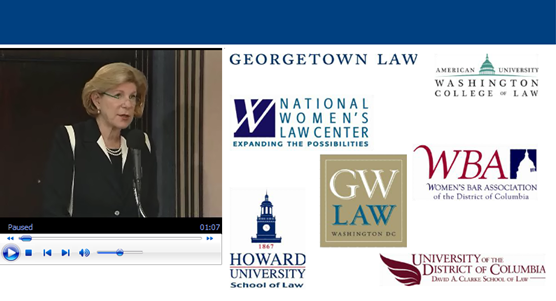Forty years ago, for the first time in the Fourteenth Amendment’s 103-year history, the U.S. Supreme Court ruled that its Equal Protection Clause protected women’s rights in the case of Reed v. Reed.

In honor of this anniversary and to assess where constitutional protections for women stand today, the National Women’s Law Center co-hosted a panel, entitled “Reed v. Reed at 40: Equal Protection and Women’s Rights.”
Justice Ruth Bader Ginsburg, who was the principal author of the brief (while working for the ACLU) on behalf of the plaintiff in Reed v. Reed led off, followed by this panel moderated by NPR’s legal affairs correspondent, Nina Totenberg:
- Jacqueline Berrien, Chair of the U.S. Equal Employment Opportunity Commission
- Earl Maltz, Professor at Rutgers University Law School, Camden
- Emily J. Martin, Vice President and General Counsel of the National Women’s Law Center
- Nina Pillard, Professor at Georgetown Law University
Justice Ginsburg remained throughout the panel and interjected her thoughts whenever she pleased. Delightfully for those watching, she pleased fairly often. The tiny woman, her voice thinned with age but projecting a gentle brilliance that time cannot dim, is clearly an expert at using Power Tool #2, “Define your own terms, first before someone defines you.” She seems intent on defining her legacy.
The room was replete with historical significance. In addition to Ginsburg, the attorney who argued Reed v Reed before the Supreme Court was also present for the panel.
Ginsburg explained that the case stemmed from a challenge to Idaho law that decreed males must be preferred to females when there was a dispute over authority in family law. The law was found unconstitutional on gender equality grounds, using the equal protection clause of the 14th amendment. It was, as you will see in the video, a breathtaking decision with far reaching ramifications.
Why this sweeping change was needed is explained here:
The framers of the Fourteenth Amendment are both heroes and villains in the story of our constitutional progression ever closer to the ideal of equality first stated in the Declaration of Independence. While the framers heroically fought for the broadest textual protection of equality in America’s constitutional history, these men (and they were all men), left untouched a number of odious forms of discrimination that today are universally recognized as blatant forms of inequality. In 1866, the framers tolerated racial discrimination in voting, did not challenge miscegenation and segregation laws, and effectively wrote into the text of Section 2 of the Amendment an approval of laws that denied women the right to vote. While the framers would launch a concerted attack on segregation in the 1870s, throughout Reconstruction they were not prepared to live up to the text’s universal guarantee of equality when it came to women’s equality.
Panelist after panelist talked about how this case changed everything for women, and men too. In fact, many of the gender equality cases subsequently have been argued on behalf of men. Nevertheless, as Ginsburg observed, it does make a difference in perception when you have “grown up in a woman’s body.” They all laughed at the example of the jurist who asked incredulously during another equal rights argument, “You wouldn’t expect a man to be a stewardess, would you?”
I’m not going to say more, because I really want you to watch the video. It’s part history lesson, part civics lesson, part lesson in Constitutional law, and entirely fascinating.
At the conclusion, Nina Totenberg described what a difference in perception it made for her personally to see three women on the Court now, after seeing none or only one for many years.
“It made my heart swell with pride to see that in my lifetime,” she said, in a show of emotion that those of us who have been interviewed by this tough reporter over the last few decades have rarely if ever seen. Then she declared, pounding her fist on the table, “We have ended this exactly on time, but that’s what you would have expected from a woman running the show!”
Gloria Feldt
Latest posts by Gloria Feldt (Posts)
- This Blog is No Longer Active… - March 17, 2014
- Women’s Equality Day and the Civil Rights March - August 26, 2013
- Stuck? Change Your Relationship With Power - July 21, 2013





 "Female Writers Kicking Up Literary Dust"
"Female Writers Kicking Up Literary Dust"